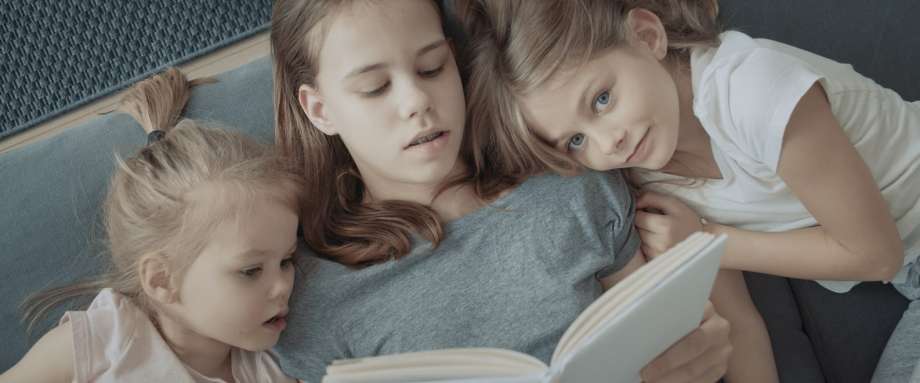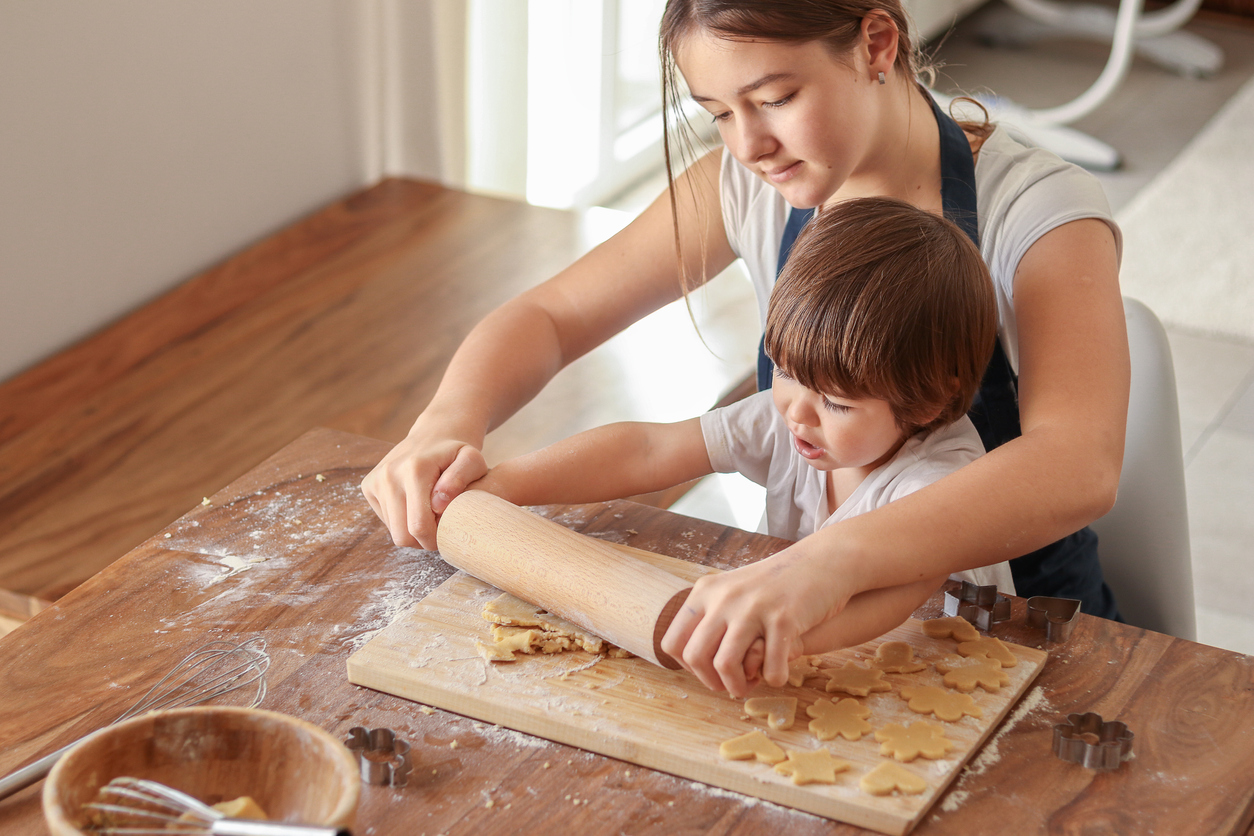Do You Have Eldest Daughter Syndrome? Guide & Checklist

Are you the oldest daughter in your family?
Do you always feel pressure to make your parents proud, even as an adult?
Did you feel like a second caretaker to your youngest siblings when you were a child or teen?
Do you identify as a perfectionist?
If you answered "yes" to most or all of these questions, you may have eldest daughter syndrome.
What is Eldest Daughter Syndrome?
The term “eldest daughter syndrome” has recently been trending on social media sites like Twitter and TikTok. for good reason.
Eldest daughter syndrome is the burden felt by the oldest daughter to serve as a form of third parent for her siblings, a role model to all family members, a caretaker for the home and even a support system of her parents.
This skewed family dynamic is a result of social and societal stereotypes and has been shown to greatly impact the mental health and relationships of daughters later in life.
If you relate to these experiences, we want to help you understand more about why and how eldest daughters are treated differently in their families.
@israajnasir @viennaayla captures the eldest-daughter-syndrome so well. Hilarious reminder to break the cycle! #eldestdaughterthings #generationalcyclebreaker #eldestdaughterproblems #therapysessions #oldestdaughter ♬ original sound - Israa Nasir
What Causes Eldest Daughter Syndrome?
Oldest daughter syndrome often occurs in stressful situations like divorce, financial hardship or the death of a family member. In these difficult times, parents don't fulfill the parent the parenting role, instead leaving their child to pick up the pieces.
In these scenarios, the oldest daughter becomes a substitute parent, taking on inappropriate, too-mature roles for a child. This treatment often coincides with first-time parents treating their first child differently as they learn what to do and what not to do when raising kids. First-time parents may treat parenting decisions as a trial-and-error process.
These parents will likely be more lenient when their second and third kids come into the picture because they either have less time/energy for discipline or feel they can depend on their older children to pick up the slack.
Cultural background can also influence eldest daughter syndrome. In Asian and Asian-American households, there is an expectation for the oldest daughter to assume more responsibilities than their younger siblings. The daughter’s role as a caretaker takes precedence over other responsibilities like friends, school work or extracurriculars.
Gender Roles and Eldest Daughter Syndrome
We may live in the 21st century, but many parenting styles still echo the gender roles of the 1950s. Women and daughters still commonly are labeled the caretakers of the home and the children – despite still being a child themselves.
Even girls with older brothers are seen as the more responsible and practical siblings because of the age-old assumption that "girls mature faster than boys."
Types of Parentification to Look Out For

While eldest daughter syndrome is not an official psychological condition, it is considered a form of parentification. Parentification occurs when a child takes on parental responsibility for their siblings and parents.
This role reversal leads to the child caring for other family members' physical, mental and emotional needs. There are two main types of parentification: instrumental and emotional.
Instrumental Parentification
Instrumental Parentification involves the child taking on inappropriate tasks for their age. These takes may include, managing finances and budgeting, getting siblings ready for school in the morning or cooking meals for the rest of the family.
Emotional Parentification
Emotional parentification involves the child caring for the emotional needs of the parent or the sibling due to the parent being emotionally unavailable.
Since firstborn children are most likely to take on the role of substitute parent, this quickly promotes the eldest daughter to the caretaker role.
Don’t believe us? In 2016, UNICEF reported that girls ages 5 to 14 years old spent 40% more time than boys their age conducting unpaid household chores.
Effects of Being Parentified on Children
Burdens placed on the eldest sister can positively and negatively impact her personal development and mental health.
Older siblings tend to have better organizational skills and are more goal-oriented and independent.
However, the pressure of playing the role of the grown-up at a young age can also lead to struggles with self-esteem, trouble establishing boundaries in different situations and the constant feeling that they need to prioritize the needs of others over their own.
Adlerian Theory: Birth Order Impacts Personality
Eldest daughter syndrome ties into the birth order theory proposed by psychotherapist Alfred Adler in the early 1900s. Adler speculated that the oldest child received the most attention from their parents. The attention helped the firstborn gain confidence and take on more leadership roles later in life.
However, this extra attention also meant that eldest children dealt with stricter rules and higher expectations from their parents than their younger siblings.
The same research on birth order and personalities found that the oldest and middle children typically serve as the peacemakers and people-pleasers of the family. Conversely, the youngest sibling or the “baby” is the child who seeks the most attention and tends to become a bit of a troublemaker.
Looking at birth order and eldest daughter syndrome side by side, you can see the correlations between the personality of the oldest child and the oldest daughter taking on the role of a substitute parent.
Oldest Daughter Syndrome Symptoms Checklist

When a child takes on parenting roles at an inappropriate age, it can hurt their mental and emotional health and can alter their adult personality.
Recognizing symptoms is the first step in overcoming the effects of a parentified youth.
Emotional Symptoms of Eldest Daughter Syndrome
Feeling as if you are responsible for everyone in your household can put a lot of stress on a person. Some of the greatest emotional markers of eldest daughter syndrome include:
- Anxiety
- Depression
- Self-doubt
- Self-blame
- Perfectionism
- Burnout
The perceived need to take care of others all the time can also lead to an inability to regulate emotions, which can cause disruptive behaviors. These can trigger problems in school, trouble navigating social situations and even aggressive behaviors in high-stress situations.
Behavioral Symptoms of Eldest Daughter Syndrome
Oldest daughter syndrome can also lead a child to develop behavioral traits that follow them into adulthood. These include:
- Overachieving
- Controlling behavior
- Overprotective actions
- Trust issues
- Difficulty handling criticism
- Struggles expressing emotions
Stress, self-doubt and the need to uphold a certain image can also lead to substance abuse. Many women also report that being parentified in their youth has lessened their desire to have a child because they feel they already served as a third parent with their siblings.
Ways Eldest Daughter Syndrome Affects Family Relationships
When a person doesn’t get the opportunity to be a child and learn to regulate their feelings and emotions, it can also have a detrimental role in their current and future relationships.
Not only can parentification cause the person to have a strained relationship with their parents, but it can also impact their romantic connections negatively.
Research studies have found that father-daughter parentification is tied to relationship insecurities and “attachment-related avoidance and anxiety.”
How to Cope With Eldest Daughter Syndrome
Coping with the effects of parentification starts with some basic steps.
-
Set Boundaries
First and foremost, start setting boundaries with your parents. Your physical and mental health should be the priority. If you believe that certain activities or people are detrimental to your well-being, you need to make the hard decision to cut them out of your life.
-
Seek Therapy and Outside Support

Of course, maintaining these boundaries with your parents is easier said than done. If your family denies your experiences or gets angry at you blaming them, seeking therapy can be a beneficial outlet.
But if therapy is not something you're comfortable with, share your experiences with a trusted friend, church or community leader or support group.
-
Focus on Self-Care and Mental Health Care
Also, look for ways to boost your self-image to allow you to see yourself in a better light. Eat healthy, exercise, journal and get outside. Positive daily affirmations remind you that you are a valuable part of this world.
-
Write Letters to Your Younger Self
You may find comfort in writing letters to your inner child about your past struggles and reminding yourself that you are not to blame for how you feel. Create a dialogue with yourself and pinpoint what to focus on throughout your recovery.
-
Put Yourself First
Take note of your behaviors and how they influence your adult personal and professional relationships. Be open to the idea of saying no and prioritizing yourself.
You can overcome the damage of your past, so keep your eye on the future.
Let go of responsibilities that are not necessary and take the time to recognize what you need to work on.
Avoiding Eldest Daughter Syndrome as a Parent
For the women who suffer from eldest daughter syndrome, research shows that you are more likely to continue the trend with your own children.
If you decide to have kids in the future, being aware of how your parents' behaviors impacted you will help you stop the cycle of parentification.

